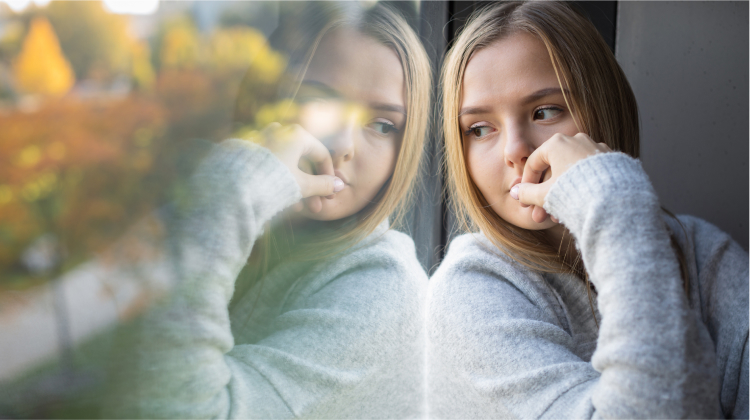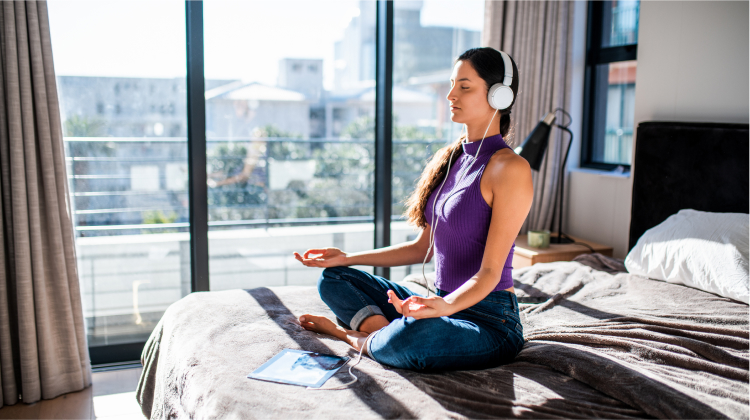Feeling Anxious For No Reason: Causes & How To Treat 2024?

Almost 34%[1] of the population is likely to experience an anxiety disorder at some point in their lives, with 20%[2] of Americans currently living with one. It’s the most common mental illness in the world, and it’s on the rise. Unreported cases are likely much higher, and unfortunately, less than half[3] of those experiencing symptoms seek treatment from a mental health professional.
While it’s perfectly normal to feel anxious for no reason, prolonged symptoms may indicate a disorder has developed, such as generalized anxiety disorder (GAD), post-traumatic stress disorder (PTSD), phobias, or panic disorder.
Many people may not even realize they have chronic anxiety, which makes symptoms sometimes appear out of nowhere. Fortunately, more than half[4] of those suffering can recover within a year with support and treatment. Read on to find out why you’re feeling anxious for no reason and how to help reduce it.
Anxiety For No Reason: Is It Normal?
It’s completely normal to experience anxiety for no reason every now and then. Anxiety is a natural human response to situations that demand our attention for survival. Stressors threaten our sense of safety, so our bodies signal stress hormones, such as cortisol and adrenaline, to get a boost of energy to manage them.
Of course, the types of stressors we encounter daily compared to our evolutionary past have changed dramatically. Back then, food was scarce and shelter wasn’t secure, making survival a daily struggle. Now, getting stuck in traffic, having too many bills to pay, or a work deadline you’re not prepared for can all set off stress-induced alarm bells.
Even if we feel it comes out of nowhere, there’s usually an underlying cause that triggers anxiety. We also often overlook symptoms, like tightness in the chest or throat, digestive issues, and headaches, chalking them up to normal daily life. However, if we pay attention, we might see we live with more triggers than we realize. Awareness of your stress triggers is the first step to taking control of occasional anxiety by changing how you react.
Why Do I Feel Anxious For No Reason?
In our overly busy lifestyles, there are many reasons to feel anxious. The chronic stress that adds up can make feelings of anxiety seem to appear out of nowhere. These are just some of the conditions that trigger anxiety.
Living In A City
Over 80%[5] of the U.S population lives in cities. Urbanization is on the rise, and it’s a cause for concern. The risks for serious mental illness, like PTSD and GAD, are higher in cities[6] than in rural areas. Social isolation and poverty are primary precipitating events.
The constant stimulation of the noise and lights of city life can create a sense of being overwhelmed and put the body in a stressful state. The fight-or-flight response is regularly triggered in these situations, even dealing with what may seem to be a regular part of your day, like non-stop meetings, crowded downtown streets, or your evening traffic jam on your way home from work.
Financial Difficulties
Money is a basic necessity that gives us a sense of safety. We feel secure when we know we can pay for a roof over our heads, clothing, and food. If these basic human needs feel threatened, it can take all our energy to worry about how we will survive. Stressing about paying the bills at the end of every month takes much more out of people than they realize.
No Work-Life Balance
Almost 70%[7] of Americans say they don’t have a work-life balance. With 50 hours a week at work and less than 12 hours of leisure and personal care, it’s no wonder why anxiety and depression are on the rise. Humans need time to rest to function properly and take basic care of themselves, like having the time to cook, see friends, engage in regular activity, and get enough restful sleep.
Social Isolation
More and more people report[8] feeling lonely these days. Social isolation[9] and loneliness are directly tied to anxiety and depression, which is why these mood disorders increased with the isolation associated with COVID.
On top of that, the rise in social media has also increased[10] feelings of loneliness, anxiety, and depression. Spending more than 10 minutes a day on social media is bad for our health, and if increased use is combined with less time seeing friends in person, anxiety is likely to rise.
Unhealthy Lifestyle
Thanks to little work-life balance and the vast availability of processed food in today’s society, almost 75%[11] of Americans are overweight, with 42%[12] classified as obese. Obese adults[13] are more likely to have mental illnesses such as anxiety and depression.
Caffeine use is also extremely high, with about 60%[14] of Americans drinking coffee daily. It exacerbates anxiety[15] and impairs the quality of sleep, which in turn also heightens anxiety.
Alcohol[16] and other drugs, like marijuana[17] in high doses, may also make anxiety worse. Unfortunately, many people turn to these substances to ease their symptoms, creating a cycle of addiction or dependence.
Relationship Problems
If you’re going through a breakup, divorce, or feel that your relationship is on the rocks, you’re more likely to feel anxious. The uncertainty that comes with relationship difficulties leads to worrying about the future, creating a general sense of unease.
Relationships at work can also cause stress. If you’re struggling to get along with a coworker or boss, any small interaction can set you off. Working in an emotionally uneasy environment can drain your energy and cause anxious thoughts or symptoms to appear suddenly, even outside of work.
Mental Health Issues
If you have other mental health struggles, such as depression or PTSD from a traumatic event, anxiety symptoms are more common.
Physical Health Problems
You have twice[18] the likelihood of experiencing a mood or anxiety disorder if you have a chronic physical condition. Hormonal imbalances, high blood sugar, heart irregularities, medication, and even sleeping pills can make you more anxious.
How To Cope With Unexpected Anxiety?
With the rise in awareness surrounding mental health issues, coping techniques you can do on your own are becoming more known.
Change Your Environment

One of the quickest ways to create a state change in your body is to put yourself in a different environment. Preferably a green and peaceful one such as a quiet park, sandy beach, or nature spot. Sitting in green space or listening to the ocean’s rolling waves reduces cortisol within 10 minutes[19], and 120 minutes[19] a week significantly improves overall well-being.
If you can’t take a break and go to a quiet green space, surrounding yourself with plants[20] or listening to nature sounds like birds chirping, or seagulls squawking also works.
Move Your Body

Our bodies were built to move, and sitting all day long can make us tense without even realizing it. Getting up every 30 minutes and stretching or walking around for both physical and mental health is recommended. Even walking[21] has also been shown to make your brain more analytical, making it easier to process emotions.
If you’re feeling anxious, putting on your headphones and dancing to an upbeat song to let all the tension out is a seriously underrated anti-anxiety method. Music[22] and dancing can also be preventative, so waking up to a little dance might change your mood for the rest of the day and help you avoid anxiety.
Breath And Meditate

Getting comfy and focusing on your breathing with guided meditation[23] also lowers stress levels. Practicing daily can also prevent anxiety symptoms from reoccurring during the rest of the day.
However, some people find it hard to just sit there and breathe when they’re experiencing a full-blown panic attack, or negative thoughts are racing a mile a minute. If that’s the case, try moving your body gently to regulate your breath, like with yoga or walking outdoors.
Journal

Writing freely for about 20 minutes[24] on average per day lowers anxiety. Reading back over your notes can also help you identify your triggers and reactions. You can also take your writing to therapy and see if you can find patterns and new avenues for healthily managing triggers.
Make A Plan

Worrying about the unknown can worsen anxiety, so making a plan for how you’re going to manage a worst-case scenario can help you feel more capable to manage whatever comes your way. If you’re feeling too overwhelmed, ask a friend or seek professional help for advice.
You can also make a plan to manage stress better in your day-to-day life, such as getting a meal delivery service, going for evening walks instead of watching TV or planning nature day trips on the weekend.
Call A Friend

Sometimes, expressing your frustrations to a compassionate friend can be just what we need. Loved ones give us a sense of comfort and safety, so next time you’re struggling, do a video chat or see a friend in person to help calm your nervous system.
Therapy

Different types of talk therapy, such as cognitive behavioral therapy[25] (CBT) or support groups, effectively treat anxiety symptoms and panic disorders. A therapist can help you recognize your anxiety triggers and develop tools that specifically work for you to manage them. While there’s a ton of advice on the internet, getting one-to-one guidance that’s personalized for your needs can make a world of difference.
Get A Check-Up

Physical conditions like diabetes, heart disease, or other chronic issues can lead to anxiety disorders. Luckily, both diabetes and heart disease can be treated simultaneously to reduce symptoms and improve overall health. It’s always a good idea to get a physical exam to ensure everything’s ok, especially if you’ve been experiencing regular anxiety attacks.
The Bottom Line
Unexpected anxiety often has an underlying cause. You can experiment with different methods to allow anxiety to flow out of your body to manage both short and long-term stressors using various techniques such as dance, journaling, or just plain walking. The idea is to keep the energy moving in a positive flow rather than balling it up as a form of anxiety.
Finally, keep in mind that anxiety is not always a bad thing. While the sensation is uncomfortable, accepting that it’s normal and even helpful sometimes lessens the feeling of suffering. Often, anxiety worsens the more we try to get rid of it.
Instead, allow yourself to feel the discomfort and use coping techniques to let it move through you to release it. From there, you can reflect, identify, and take action toward whatever is bothering you.
+ 25 sources
Health Canal avoids using tertiary references. We have strict sourcing guidelines and rely on peer-reviewed studies, academic researches from medical associations and institutions. To ensure the accuracy of articles in Health Canal, you can read more about the editorial process here
- Bandelow, B. and Michaelis, S. (2015). Epidemiology of anxiety disorders in the 21st century. Dialogues in Clinical Neuroscience, [online] 17(3), pp.327–335. doi:10.31887/dcns.2015.17.3/bbandelow.
- National Institute of Mental Health (NIMH). (2017). Any Anxiety Disorder. [online] Available at: https://www.nimh.nih.gov/health/statistics/any-anxiety-disorder
- Alonso, J., Liu, Z., Evans-Lacko, S., Sadikova, E., Sampson, N., Chatterji, S., Abdulmalik, J., Aguilar-Gaxiola, S., Al-Hamzawi, A., Andrade, L.H., Bruffaerts, R., Cardoso, G., Cia, A., Florescu, S., de Girolamo, G., Gureje, O., Haro, J.M., He, Y., de Jonge, P. and Karam, E.G. (2018). Treatment gap for anxiety disorders is global: Results of the World Mental Health Surveys in 21 countries. Depression and Anxiety, [online] 35(3), pp.195–208. doi:10.1002/da.22711.
- England, N. (2018). NHS England» NHS welcomes record high recovery rate for common mental illness. [online] England.nhs.uk. Available at: https://www.england.nhs.uk/2018/02/mental-illness-recovery/
- Un.org. (2018). 2018 Revision of World Urbanization Prospects | Multimedia Library – United Nations Department of Economic and Social Affairs. [online] Available at: https://www.un.org/development/desa/publications/2018-revision-of-world-urbanization-prospects.html
- Gruebner, O., Rapp, M.A., Adli, M., Kluge, U., Galea, S. and Heinz, A. (2017). Cities and Mental Health. Deutsches Ärzteblatt international. [online] doi:10.3238/arztebl.2017.0121.
- Oecdbetterlifeindex.org. (2020). OECD Better Life Index. [online] Available at: https://www.oecdbetterlifeindex.org/topics/work-life-balance/
- Ballard, J. (2019). Millennials are the loneliest generation. [online] Yougov.com. Available at: https://today.yougov.com/topics/society/articles-reports/2019/07/30/loneliness-friendship-new-friends-poll-survey
- House, J.S., Landis, K.R. and Umberson, D. (1988). Social Relationships and Health. Science, [online] 241(4865), pp.540–545. doi:10.1126/science.3399889.
- Hunt, M.G., Young, J., Marx, R. and Lipson, C. (2018). No More FOMO: Limiting Social Media Decreases Loneliness and Depression. [online] ResearchGate. Available at: https://www.researchgate.net/publication/328838624_No_More_FOMO_Limiting_Social_Media_Decreases_Loneliness_and_Depression?enrichId=rgreq-970766ac6a2b201fa2d85092ef13d3de-XXX&enrichSource=Y292ZXJQYWdlOzMyODgzODYyNDtBUzo2OTEwNzYzMjMwODIyNDRAMTU0MTc3Njg0Mzc0Mg%3D%3D&el=1_x_2&_esc=publicationCoverPdf
- Anon, (2022). FastStats – Overweight Prevalence. [online] Available at: https://www.cdc.gov/nchs/fastats/obesity-overweight.htm
- CDC (2022). Adult Obesity Facts. [online] Centers for Disease Control and Prevention. Available at: https://www.cdc.gov/obesity/data/adult.html
- CDC (2022). Consequences of Obesity. [online] Centers for Disease Control and Prevention. Available at: https://www.cdc.gov/obesity/basics/consequences.html
- Rehm, C.D., Ratliff, J.C., Riedt, C.S. and Drewnowski, A. (2020). Coffee Consumption among Adults in the United States by Demographic Variables and Purchase Location: Analyses of NHANES 2011–2016 Data. Nutrients, [online] 12(8), p.2463. doi:10.3390/nu12082463.
- Winston, A.P., Hardwick, E. and Jaberi, N. (2005). Neuropsychiatric effects of caffeine. Advances in Psychiatric Treatment, [online] 11(6), pp.432–439. doi:10.1192/apt.11.6.432.
- Anker, J. (2019). Co-Occurring Alcohol Use Disorder and Anxiety: Bridging the Psychiatric, Psychological, and Neurobiological Perspectives. Alcohol Research: Current Reviews, [online] 40(1). doi:10.35946/arcr.v40.1.03.
- Stoner, S. (2017). Effects of Marijuana on Mental Health: Anxiety Disorders Considering Locked vs. Unlocked Treatment Facilities. [online] Available at: https://adai.uw.edu/pubs/pdf/2017mjanxiety.pdf.
- Cmha.ca. (2021). The Relationship between Mental Health, Mental Illness and Chronic Physical Conditions. [online] Available at: https://ontario.cmha.ca/documents/the-relationship-between-mental-health-mental-illness-and-chronic-physical-conditions/
- Meredith, G.R., Rakow, D.A., Eldermire, E.R.B., Madsen, C.G., Shelley, S.P. and Sachs, N.A. (2020). Minimum Time Dose in Nature to Positively Impact the Mental Health of College-Aged Students, and How to Measure It: A Scoping Review. Frontiers in Psychology, [online] 10. doi:10.3389/fpsyg.2019.02942.
- Lee, M., Lee, J., Park, B.-J. and Miyazaki, Y. (2015). Interaction with indoor plants may reduce psychological and physiological stress by suppressing autonomic nervous system activity in young adults: a randomized crossover study. Journal of Physiological Anthropology, [online] 34(1). doi:10.1186/s40101-015-0060-8.
- Miller, J.C. and Krizan, Z. (2016). Walking facilitates positive affect (even when expecting the opposite). Emotion, [online] 16(5), pp.775–785. doi:10.1037/a0040270.
- WU, S.M. (2002). EFFECTS OF MUSIC THERAPY ON ANXIETY, DEPRESSION AND SELF-ESTEEM OF UNDERGRADUATES. PSYCHOLOGIA, [online] 45(2), pp.104–114. doi:10.2117/psysoc.2002.104.
- Hoge, E.A., Bui, E., Marques, L., Metcalf, C.A., Morris, L.K., Robinaugh, D.J., Worthington, J.J., Pollack, M.H. and Simon, N.M. (2013). Randomized Controlled Trial of Mindfulness Meditation for Generalized Anxiety Disorder. The Journal of Clinical Psychiatry, [online] 74(08), pp.786–792. doi:10.4088/jcp.12m08083.
- Niles, A.N., Haltom, K.E.B., Mulvenna, C.M., Lieberman, M.D. and Stanton, A.L. (2013). Randomized controlled trial of expressive writing for psychological and physical health: the moderating role of emotional expressivity. Anxiety, Stress, & Coping, [online] 27(1), pp.1–17. doi:10.1080/10615806.2013.802308.
- Carpenter, J.K., Andrews, L.A., Witcraft, S.M., Powers, M.B., Smits, J.A.J. and Hofmann, S.G. (2018). Cognitive behavioral therapy for anxiety and related disorders: A meta‐analysis of randomized placebo‐controlled trials. Depression and Anxiety, [online] 35(6), pp.502–514. doi:10.1002/da.22728.



